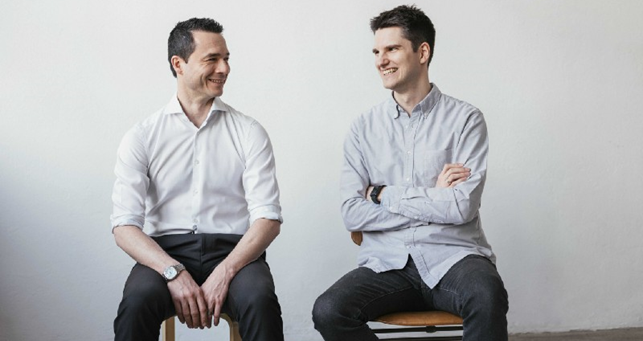Maersk Blog, Partner, Jeppe Høier April 9, 2019
I met Flavio Alario, the CEO of fliit, in April of 2018. It’s been a long time since I’ve spent time with such an energetic, hardworking and happy founder. A clear focus on creating a solid culture where everybody respects each other and an appreciation of how everybody contributes to the team is not that common. Flavio being a logistics expert with more than 15 years of experience has a sharp vision of how to position the company and what problems the industry faces. With the recent addition of Jan Hoberg as COO and MD the company is in a solid position to move forward on its path to digitizing last mile B2B cold chain logistic.

Maersk Growth is joining an experienced group of Investors and Business Angels. Backed by angels such as Philip Kreibohm, Oliver Roskopf, significant early stage VCs such as IBB, BTH and b10 (Daniel Hoepfner) and Alstin (Maschmeyer Group) where I’ve had the pleasure of collaborating with Kiana Mardi.
fliit pivoted in 2017 from the higher margin, low revenue consumer focused to-door delivery to doing B2B delivery within food logistics, the only one in the industry to do so. A powerful proposition of onboarding the longtail of German refrigerated carriers and matching them with shippers leveraging Maersk expertise within cold chain logistics sets fliit up for an interesting journey.
The logistics industry is being automated and digitalized, some even say disrupted. It’s a fact that start-ups within the logistics industry is seeing massive capital and in 2018 reached an astonishing USD 8bn. I personally believe that the disruption will not come in the near term due to logistics being dependent on heavy asset investments, multiple touchpoints and complicated operative systems. We are a part of the ecosystem and are very interested in the different solutions and business models that can address industry pain points and increase customer satisfaction. We are at a stage where technology is developing fast but some of the main difficulties in predicting the physical movement of goods will still take some time to overcome, since they depend on access to the massive data amounts among many different stakeholders in the logistics industry.
fliit is one of the start-ups that is trying to solve the challenges within the logistics space leveraging technologies such as AI/ML. There are many different reasons why it is necessary to use these technologies and below are some of the observations from speaking with more than 70 different start-ups, significant VC’s/CVC’s as well as industry leaders.
1. CO2 emissions — Studies have shown that more than 20% of all EU trucks drive around empty and up to 50% are not fully loaded. This is a massive problem for the world and generations to come and must be reduced to zero. This is clearly possible by leveraging data to optimize triangulation and density. It is estimated that the optimization of CO2 emissions from land freight in EU can reduce total emissions by 10%.
2. Lack of truckdrivers. The EU driver shortage is estimated to be 150.000. Germany faces a lack of 45.000 increasing with 28.000 per year. This is significant and something we need to take seriously. And yes I know that the selfdriving truck will come, but that will not be in a foreseeable future. We should see the rise of platooning before we see the selfdriving truck, although that Daimlers Trucks and Busses CEO Martin Daum has been quoted for saying that Daimler is abandoning platooning and focusing on automation.
3. Transparency/On-time delivery. All companies want to give the best service to their customers. Shippers increased demand on goods to be tracked and Business Intelligence to be developed to create transparency and cost savings. Costumers/consumers are increasingly expecting goods to be delivered quickly (days) after payment.
4. High costs of transportation. It’s estimated that 30% of all logistics costs are associated with operating in the Supply Chain. There is a clear benefit of digitalization in the industry which should benefit both the consumer as well as the truckdriver. To me the truckdriver seems to be the most important stakeholder in the supplychain, so the company that creates the best offering to carriers and drivers will be a category winner in the western world.
5. The longtail of carriers in North America and Europe serve the smaller shippers and are not able to serve the large enterprises. The digital platforms like Fliit, Loadsmart, Convoy, Manbang, InstaFreight and many others enable the smaller carriers to compete through theses platforms. Personally, I see a benefit of enabling the smaller carriers and the Blue-collar worker to get a better worklife balance. This is the power these platforms give the Blue-collared worker, which I personally see as the most important piece in the last-mile delivery.
We have followed the start-up Freight Forwarding ecosystem closely for more than 18 months and been in dialogue with many of the companies. Within Road Freight Forwarding there are many upcoming start-ups. We invested into US based Loadsmart in 2018 led by CEO, Ricardo Salgado. A clear technology focused company aiming at creating the best Artificial Intelligence to be leveraged within the Spot-market.
I’m excited about our investment in fliit and spending time with Flavio and the whole team in Berlin and the opportunity to leverage more than 100 years of experience from Maersk to create a category winner within European food logistics.
A.P. Moller — Maersk is an integrated logistics company working to connect and simplify its customers’ supply chains. As the global leader in shipping services, the company operates in 130 countries and employs roughly 76,000 people. Growth is Maersk’s launchpad for new ventures and is part of Maersk’s overall efforts to drive the transformation of the transport and logistics industry and shape the future of trade through connecting start-ups and ideas with operational expertise and world-class infrastructure. For more information on Maersk, visit growth.maersk.com.







